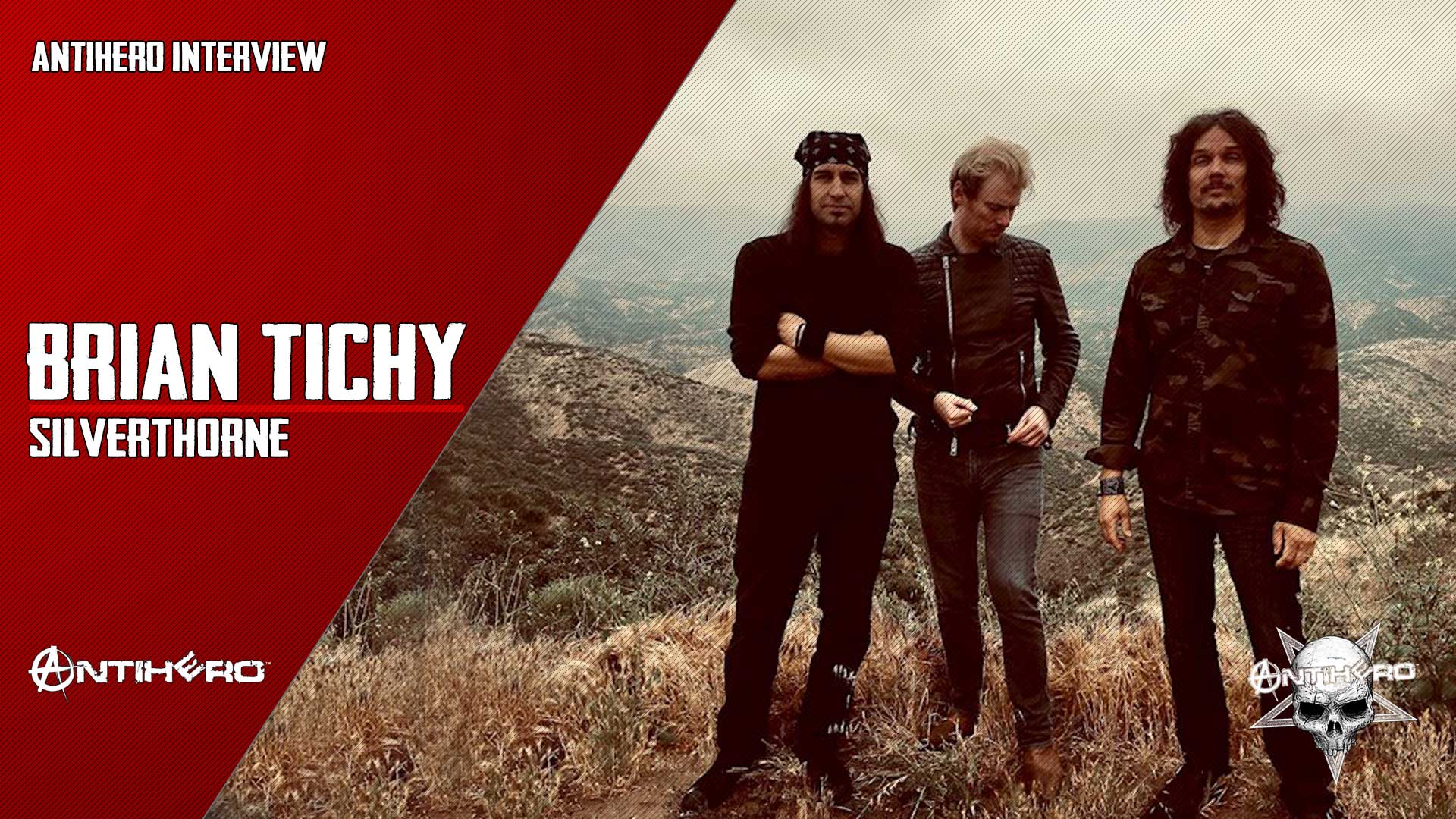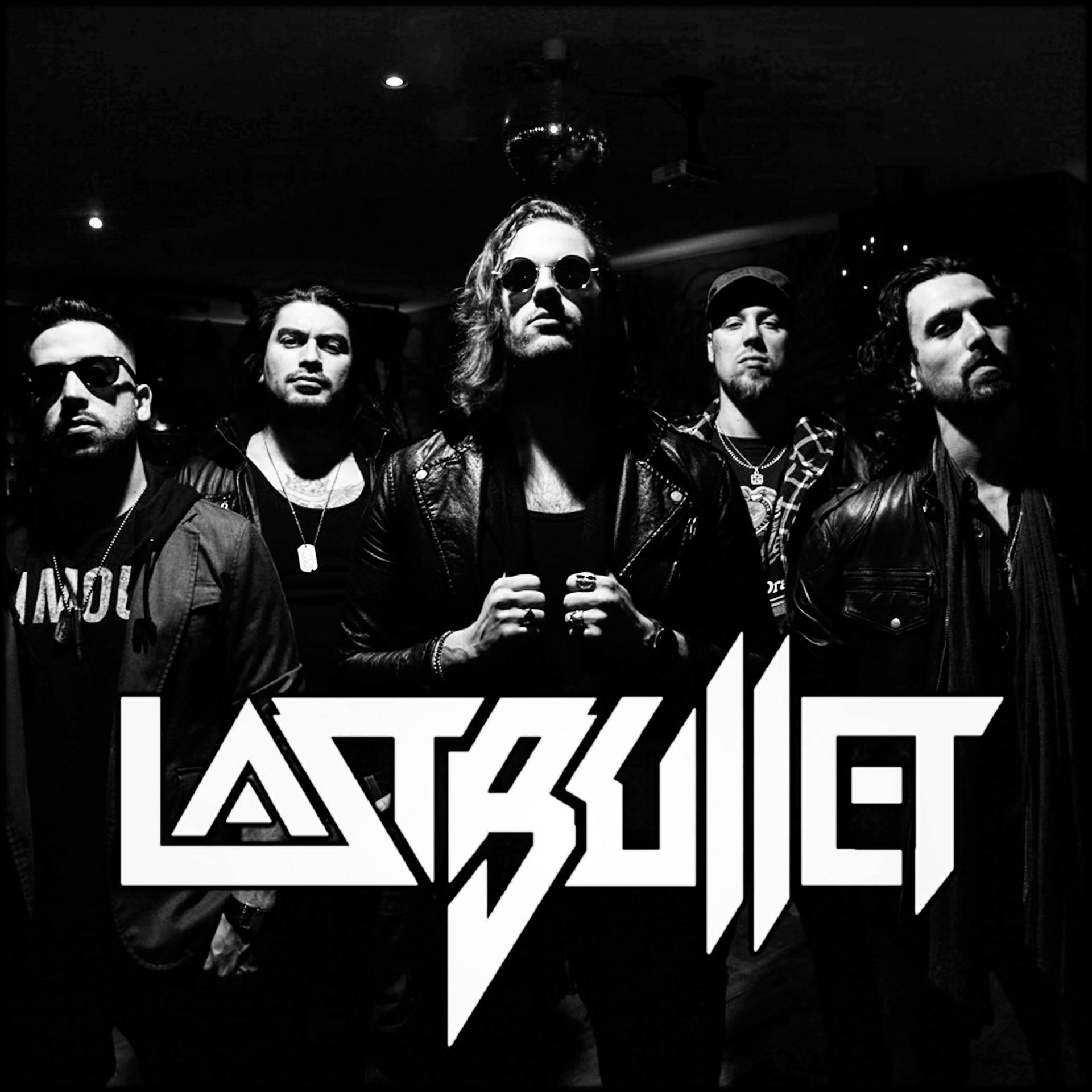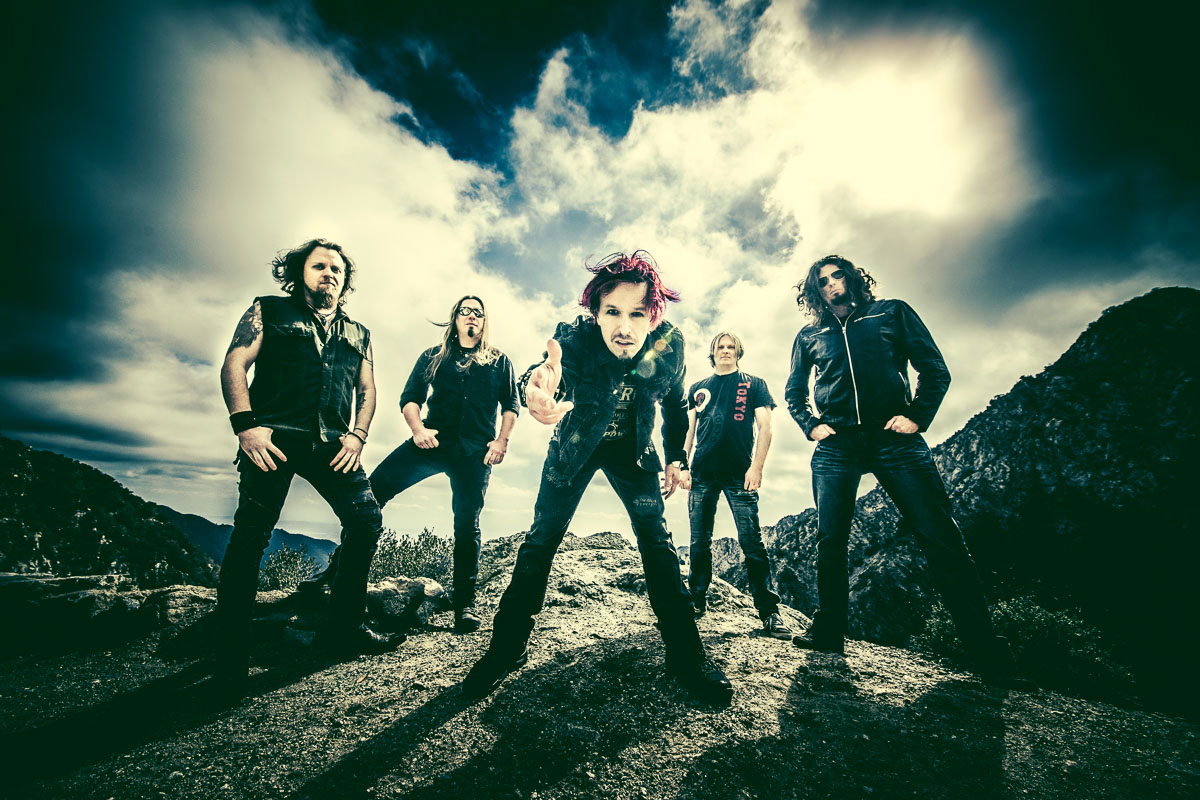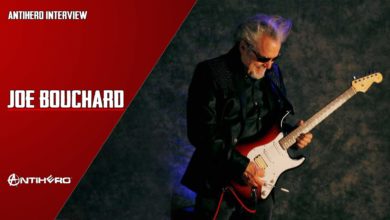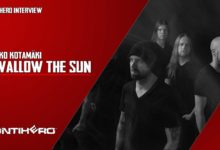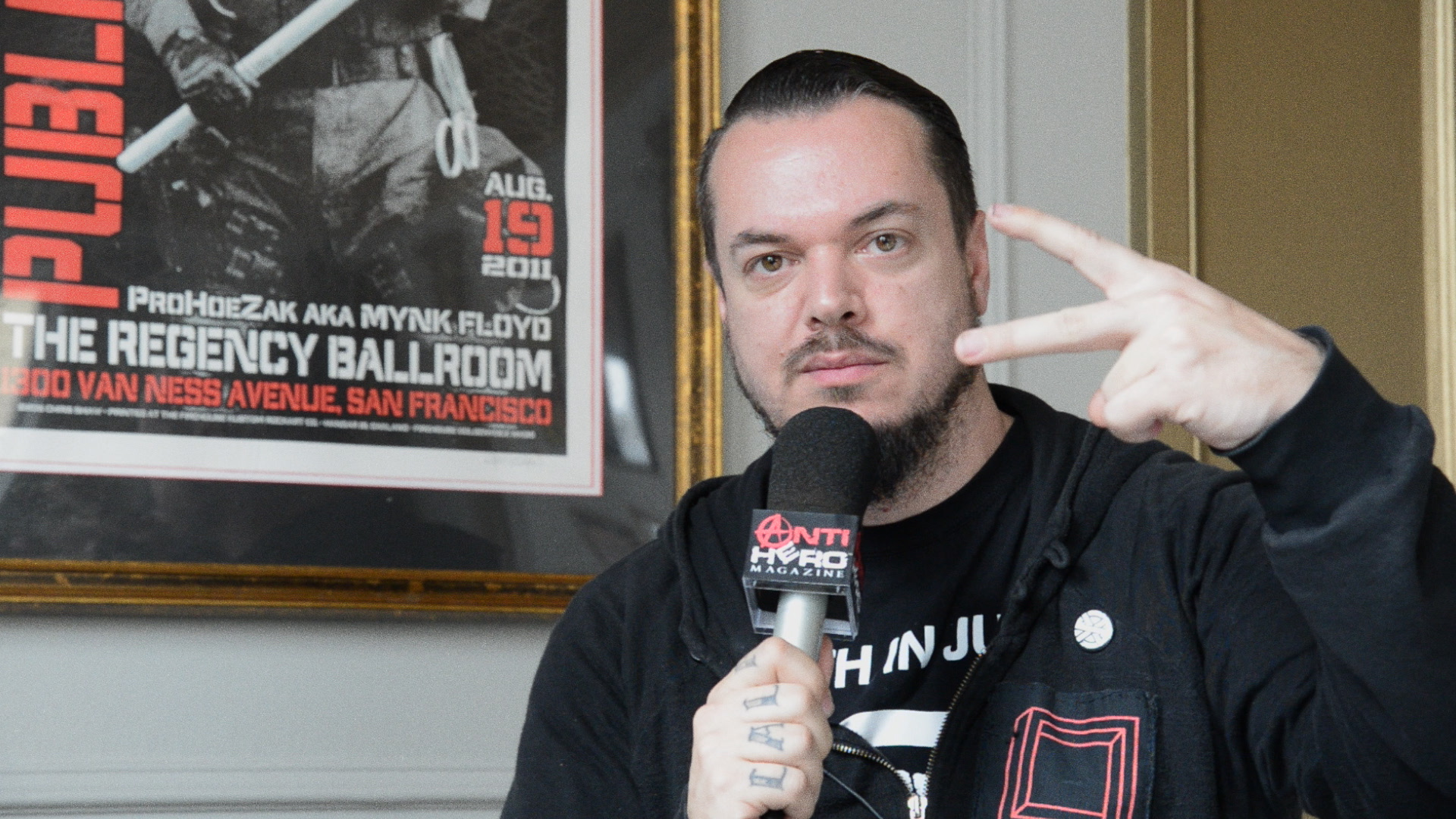SILVERTHORNE are the rock band that people have been searching for! Producing a bombastic yet deeply authentic sound that delivers exciting, soulful and earthy rock songs SILVERTHORNE manage to cross rock genres with ease, whilst still flowing smoothly into your They tip their hat to the classic rock bands of yesteryear as well as looking firmly to the future and that future is looking exceedingly bright.
Featuring the soaring powerhouse vocals of Englishman PETE SHOULDER (Winterville, The Union) and superstar drummer BRIAN TICHY (who has played with everyone from Whitesnake, Ozzy, Slash, Billy Idol, Foreigner and many more legendary artists), along with bassist DANIEL SPREE, SILVERTHORNE recently delivered a monstrous debut single in the shape of “Tear The Sky Wide Open”
The track caught the attention of fans and critics alike. With its ominous riff, huge chorus, driving bass, weighty drums and a groove that evokes the vast expanse of the Southern California canyons from where the band was born, ‘Tear The Sky Wide Open’ has already got fans salivating. The teaser video for the track received over 20,000 views in its first 24 hours of release across the band’s social media platforms. That figure doubled the second day! An amazing result for a brand-new act!
SILVERTHORNE delivered their 2nd single and Video “Black River Rising” in November and it is another riff laden beast of a track. Darker and more brooding than its predecessor; ‘Black River Rising’ sees the band members dig extremely deep within and leave nothing behind on this track.
SILVERTHORNE also says of its sound:
“You may hear elements that are not unlike being at a Led Zeppelin concert with Cream and Free opening, while Soundgarden and QOTSA hang at the bar.”
Following the band’s EP release, I was able to have a chat with Brian Tichy to discuss all things Silverthorne, his musical past, and also what lay on the road ahead for him musically.
ANTIHERO: How are you doing in this very difficult time for the world?
Brian Tichy: I don’t know. Doing the same as everybody. I’m at home and trying to get the studio stuff happening and all that. Where are you calling from?
ANTIHERO: I’m in the UK.
Brian Tichy: Oh, cool I am continuing to record. Pete is in the UK over there with you, and I’m in Los Angeles, but sometimes if we have to, if he’s not here, we just talk on the phone or we write online, and I’ll throw drums down here and send him stuff. He’ll start his vocals, we’ll start writing like that. So we were literally just going through a whole slew of ideas we have for the next LP and figuring what do we have down recorded already, what do we do to move with that, and what new stuff can we start with, and get him some drums and he could start putting ideas down. So yeah, we’re getting that going for sure.
ANTIHERO: I was actually going to ask you why the band has decided just to release an EP. I mean, just wondered if there’d be any more music, but that’s basically answered that.
Brian Tichy: Yeah, well, we did an EP for a couple of reasons, but the main reason was we had an LP’s worth of stuff recorded, but just as a big picture full LP, we would have wanted to have written more to just see what else we’d have to AV. You know, okay we had this stuff, now we have this stuff and let’s take the best of it. But because of time and due dates and everything, we just wanted to get a strong EP representing where we were at, at that point in time out first.
Because last year when we got the record deal, we pulled all this together in the spring, and to continue recording and writing/recording, mixing, mastering while doing art work and getting everything together to make a full LP, it would have just dragged into the summer. But I was going to be in Japan working all summer, so we were just like, “Let’s just get a solid EP together so when the first single comes out in August…” so we have time to get everything together. You know, make the videos, get the art work together, mix and master the final five songs we wanted on the EP.
We had just enough time to make that happen, but if we went down the road of completing a full record, I don’t know if we would have had enough time to see that through completely with the schedule that I already had booked.
ANTIHERO: I was going to say, you normally sort of go from one musical project to another quite quickly. This current situation must have really messed up your schedule for at least, well the rest of this year anyway.
Brian Tichy: You mean Silverthorne, balancing that with other stuff? Yeah, you know, we’re doing this because we want to because when Pete and I wrote together and started putting this all together, we thought we had something pretty solid that we were excited about. At the same time just because you have something solid or you get a record deal or whatever doesn’t necessarily mean all of a sudden the band’s going to be selling records or bringing in money to take care of the bills, it’s like you still have to work.
But we believe in it, so we were like, regardless of those hurdles and all the hurdles that every new band has to take on, we want to see this through. We believe in it. So there’s no guaranteed timing when you have something that even if it is a solid product, or it’s got a record label behind it, there’s no guarantee of how long things take to move in a way where you can really dedicate full non-stop time to it, so you have to balance it out, you know? But we were prepared to do that. Whatever it takes to make this band happen.
I would ultimately love, I mean, all three of us in the band would love if this was our full-time gig, but to make that a reality you have to build a band, and building a band takes time, so you know, we’d be ready to do it of somebody said, “This is all you guys are doing. This is it. You’re doing Silverthorne.” I’d be like, “Fine. Great. That’s what I want to do.”
ANTIHERO: Do you prefer generally being your own boss in terms of work schedule with a degree of flexibility and freedom rather than working for a huge rigid and more structured band setup like Whitesnake or the Dead Daisies?
Brian Tichy: You know, there’s the pros and cons to everything. When you commit to a big well-established band with a nice chunk of work going on annually, that’s great. Great for all musicians to be in a position where they’re in a band that can work a lot throughout the year and you have the guarantee sitting there, and that income coming in. That’s all cool. And yeah, I can’t complain about any of the bands I’ve been in. It’s always been a lot of fun and it’s all cool.
Then if you’re not in one of those bands, yeah, there’s total freedom to be able to do whatever you want, when you want, which means any new things that pop up, new projects to work on or new bands to get involved in. That keeps that door open. But like I said, it’s a balance. There’s a balance of how much do you want to commit to a band, because when you do commit to a band it’s pretty much 100%. It might not be 12 months a year, but even if it’s six or eight months a year, that’s a majority of your year. So you’re really giving 100% to that band, and those months that you’re not on tour working with them, you’re trying to get your other stuff going or you’re with your family, so how many other projects can you really start in between being in a well-established band. It’s kind of hard.
But I’m cool either way. My main thing is just get to work as much as I can, like all of us. Keep the bills paid and keep everything intact. But also, we’re only on this planet for so long, so you want to make the most of it. You want to kind of see how far you can push yourself to prove to yourself that all these years of being a drummer, a musician, whatever, you want to go as far as you can go with it. I’ve never been satisfied with… Whatever band, I’ve never been like, “Oh, this is it. I’ve made it. Everything is cool. I have nothing else to prove to myself.” It’s like, “No, this is cool, but if I’ve come this far, why can’t I go further,” you know?
ANTIHERO: Yeah. Most of your recorded work is in the category of heavy rock. I just wondered if there are any other musical genres that you’d like to tackle and maybe you haven’t had a chance or opportunity to?
Brian Tichy: Yeah. You know, I grew up as a rock drummer, but the other two angles outside of what you’d call hard rock would be more of the progressive angle just to let loose a little bit more on that side and just challenge yourself in a progressive way. And then there’s the whole funk side because I absolutely… Anything that you might consider funk or funky, for me as a drummer, I think the most important thing is the groove, and for me the most fun grooves to play are funk grooves.
So even, there’s a lot of funk in rock, whether it be Zeppelin or Van Halen or whatever. If you really listen to those grooves, a lot of them come out of a more funk-based groove. They’re just done more aggressively or loudly or whatever. But yeah, man, if I had to jump in or start or be a part of other projects, I would love to be involved in stuff where I could completely become a full-blown funk drummer or progressive.
ANTIHERO: Regarding drums, you mentioned there that funk groove, drums and bass are sort of the backbone of a band. I just wondered with your past, pretty extensive pedigree, who would have been absolutely the most influential bassist that you’ve ever worked with?
Brian Tichy: Oh man, I won’t be able to name just one, but I’ve played with so many great bass players in so many ways. I wouldn’t even want to start naming a list right now because I know I’d go, “Oh, wait, we finished… I forgot this guy,” you know? But I’ve had the good fortune to play with so many great bass players, and yeah, they’re all my good buddies still, and hopefully, I keep playing with them. But you know, to name one, I really couldn’t because everybody’s got their own little thing.
As I said, everybody’s got their own personality, and their personality comes through their playing, and it depends on what the end purpose of is, what the vibe is between me and the rhythm section. When I was playing in Billy Idol, it’s a different kind of thing than playing in Whitesnake. The bass players in those bands, Steve McGrath in Billy Idol, and Michael Devin in Whitesnake are both great for those bands. They’re great all-around bass players in many ways. But you know, as far as touring in those kinds of bands, they got the job done and we locked up, and that was the main goal. But yeah, I just had the good fortune of playing with tonnes of great bass players for sure.
ANTIHERO: Your musical influences are widely reported,especially with Zeppelin and Rush, but I just wondered at what point did you actually progress from listening to those bands to actually deciding, “Music is something I want to do for my own career”?
Brian Tichy: Well, those two bands are huge influences back in the day when I was learning how to play, and still are to this day, as are tonnes of other bands. You just take your influences and roll with it. Maybe over the years some influences aren’t as heavy as they were when you started, but going down the road a bit, I definitely still look up to the same major influences I had as a kid that I still look up to the same ones now, especially Zeppelin and Rush and John Bonham and Neil Peart, Alex Van Halen. I think forever my favourite drummers, the ones that affect me the most, and affected me the most and I still listen to and get most excited about even though there are hundreds and hundreds of drummers that I absolutely love.
At the top of my list has always been John Bonham, Neil Peart, and Alex Van Halen, and to this day it still is for tonnes of reasons.
ANTIHERO: At what point growing up listening to music did you actually decide, I’m sure you like most people tried other careers early in life. I just wondered at what point was it that you made it your primary goal to be a professional musician?
Brian Tichy: Yeah, early on. I never really had any other occupations. I think I knew once I started playing drums when I was like eight years old, nine years old, I knew that was it. I didn’t know how I was going to be a drummer for the rest of my life of course, I had no clue. You buy your records and look at your posters on the wall and listen to your favourite bands and go, “I want to do that,” and here I am 10 years old, I have no clue what I’m talking about. But this is what I do the most, this is what I think I probably do best, and this is what interests me the most, and it’s never changed. There’s never been a doubt in my mind, there’s never been a time where I said, “Oh, maybe I should think of something else,” ever. And come this far, so I’m not turning back. I have no intent of changing it up. You know, I’ve just always been a drummer, just wanted to be a drummer.
But yeah, somewhere in… I guess. After high school I went to Berkeley Music College, which is a full-blown music college in Boston and got completely immersed in practising and year-round thousands of other musicians you’re learning from all the time. It’s just non-stop. So the years there were huge to me as far as just getting better and learning, and not really caring about the outside world at all. You were just in this college music atmosphere and that’s all you did.
But when I got a gig out of there, my first true gig of, “Okay, I’m playing drums and getting paid,” and this band I joined did some touring and stuff, it was great. It was like, okay, cool, man. I’m on a tour bus. I might not be making much money at all, but who cares? I’m out here playing drums and this is what I want to do. As soon as you get a taste of it, I think you know. You know I’m cut out for this or I’m not. But I was just like, “Hopefully this is just the beginning, because I love it. This is what I’m going to do. That’s it.”
ANTIHERO: Do you remember hearing a song of yours on the radio for the first time?
Brian Tichy: Yeah, yeah. That’s definitely a cool memory when you hear your drums on the radio. It’s cool as anything. When you get to meet one of your idols, or you go on tour opening up for a band that you’ve worshipped since you were a kid, or actually join a band, I mean, all those memories, those are great. I’ve told many people that’s what gets you through the “hard times” or the times where you might be struggling a bit more. Those feelings and memories are what keep you going. It’s like, “Okay, I did this.”
I either heard great words of positivity from either a drum I admire or a band, or proven I can get an audition for this band and get this gig or whatever, it keeps you going. You have to rely on that stuff at times more than others. Just all those great memories, and yeah, it’s a great feeling to hear your drums or a song of yours on the radio. It’s great. It’s even greater when people take note of it, you know?
ANTIHERO: What would be the pros and cons of being a professional musician? I’m sure the music business has changed a hell of a lot since you first started. What would be the pros and cons of being a professional musician in 2020?
Brian Tichy: Oh, there’s probably more pros and cons in this business than any other even though I don’t know much about other businesses’ pros and cons. But the ups can be so great and the down can be so great. And that can happen within one year, you know what I mean? You could be literally down and out, and then you get a phone call or an audition, or somebody calls you for something that literally changes your life. I think that’s the beauty of doing what you love, because when it does come around, being able to take advantage of opportunities. When it does work out, man, there’s no better feeling, because there are no guarantees.
You can’t go to a college and graduate as a musician and all of a sudden you have this, “Okay, I have a degree from a music college, so therefore that means I will get jobs that pay this much and are on this level.” There’s none of that, man. It’s all about you proving yourself behind your instrument. You can be seen on YouTube doing that, in a club doing that, or wherever. Any day you’re seen and heard playing can make a huge difference. We’ve all experienced that, you know?
You talk to anybody, “How’d you get this gig,” or, “How did you meet this person?” or “How did you get from A to B?” and usually it’s about people hearing you. That’s the first thing. I have nothing to say when I go into new projects or new band situations. I just keep my mouth shut because nobody really cares until I prove that I can get the job done. Get the job done and people are happy, okay then you know you’re going to be around a bit, and you can talk to everybody, but before that, my main thing is just to prove myself behind the kit and get the job done.
ANTIHERO: I learned earlier you have experienced many career highs. I just wondered if you still had hopes and dreams. What keeps you going? What keeps you motivated?
Brian Tichy: Yeah, the same as it’s ever been. Like I said, anything you’ve done in your past, it was either a pivotal point in your career or something that made you realise this is what you’re going to do forever, or it was just a nice step in the positive direction. All that stuff, it might not be in the form of a paycheck at all. It might just be great words from a peer or someone you grew up listening to, that stuff keeps you going.
Like I said, for anybody, if you got to a certain point, and you’ve experienced success, why wouldn’t you be able to go further than that? What would stop you? I’ve watched some of my friends, drummers that are coming up around me, get into huge bands and they’ve been there for a long time, and they’ve had great success, and they’re still there and that’s awesome. Nobody can necessarily say which person is going to be that person.
It all gives you hope. It’s like, “Hey, man, you’ve proven yourself here and there. Why wouldn’t you be able to prove yourself in bigger ways than you have in the past?” If you talked to me 20 years ago I wouldn’t be able to say a lot of the things I’m saying now, and then a bunch of years go by, and you’re like, “Okay, cool. Got my experience and knowledge and done more of this and that.” And I guess in some ways it can make some people jaded, you know, but not for myself. I take it all as positive stuff, man. I should be in a better position than ever now to more confidently do everything I want to do and try to accomplish all that.
For me, the top of that is always having your own band. Having your own band where you write the songs, it’s your ideas, it’s your vision seen through and it becomes a sustainable force. You know what I mean?
It’s your full-time job a la the biggest bands in the world, whatever, Who, Queen, Rush, AC/DC. These were just guys jamming in a room. They wrote some songs and were dedicated and driven, and they stuck. Fans heard it, dug it, and they kept it going, man, and now they’re some of the most iconic rock bands in the world. Those guys were sitting in their garage like everybody else at one point in time. So it’s dedication. It’s also the art of being able to play well together, and write great music together.
I mean, you can have great musicians in a starter project, maybe they didn’t write music or songs that are going to resonate in a way that keeps them moving to bigger places. But yeah, you just gotta keep believing in what you’re doing. For me, I would love to see Silverthorne being a brand new band with a little EP out and just getting started. I’d love to see us grow and grow and grow to where it’s not something I have to fit in between other things I’m doing. It is the thing I’m doing.
ANTIHERO: You’ve still obviously got the fun element. I mean, you’ve got side projects and bits and pieces that you’ve done over the years, like those Zeppelin gigs, Steamroller, for example, it’s nice to obviously have those where you can step away and have a little bit of fun as well.
Brian Tichy: That stuff’s always there. It’s just a matter of the people in the band, everybody’s schedules lining up. You go, “Hey, you want to do a gig or have some fun, get a little run together?” Yeah, that’s all cool. All those different variations of side projects are always fun. Some of them continue on after years, and some of them don’t. But yeah, the cool thing is it’s always been done amongst friends, you know?
As you said, Steamroller was myself and Doug Aldrich and Michael Devin coming off of a Whitesnake tour. Like, “Okay, we’re not touring this year so let’s keep playing together. Let’s go have some fun.” And we had a lot of fun doing it.
ANTIHERO: Okay, you mentioned there’s Silverthorne. Obviously you’ve got long-term plans, long-term goals for that band. How do you anticipate, well, before the current situation, did that going forward plan for Silverthorne actually include live shows or was that something you hadn’t actually gotten around to thinking about yet?
Brian Tichy: No, we did a couple shows at the end of the year, and we had new tour dates lined up. We were booking it as this whole virus thing started. In a way I’m glad that we didn’t go and announce something and then have to cancel it before it happened, because then you’re putting more time into it, making it into a bigger deal, and then it’s like, “Oh, well, that’s put on hold. That’s going to be rescheduled.” So yeah, I mean, everything is stopped now, so once it all gets back to normal and everybody gets through this, then the goal is definitely to get out there with Silverthorne.
We can’t do much now, and there’s no real date. Dates keep changing, and things are changing, and all you can do is roll with it. Then at the end of it go, “Okay, where are we at?” Because I’m also playing in Lynch Mob now, and we had a lot of dates cancelled. The February dates, nice run in the U.S. a couple weeks, then we had a bunch of work in… I’m sorry, what did I say, February? March, we had a March run, then we had all these April dates, and I don’t know what’s going to happen to May yet. But man, that’s all been pushed down the line, so once everything opens back up, I just gotta sit down and figure out what’s the time frame now? What are we doing? How much of that can we make up? What else do we have going on? And start balancing it all and trying to make it all happen.
But the goal is definitely to write a new Silverthorne LP now, get on that now while we have the time, and then once all this is in the past, get back out there and start playing.
ANTIHERO: Just a final question for you, I’m sure you’ve done many interviews over the years. I just wondered if the roles were reversed and you could become the interviewer, which personal hero or inspiration would you like to interview yourself?
Brian Tichy: Oh, there’s so many, but off the top of my head, I would probably go to my favourite musician in the world, Jimmy Page, because I have a tonne of questions to ask him. It would probably be mainly about songwriting and recording, being in the studio and the songwriting process, because he’s my favourite music, my favourite band, and absolutely love him. So yeah, I’d start with him, and yeah, if Neil Peart was still around, I’d love to talk to him about drumming. Yeah, there are tonnes, you know? John Bonham, Alex Van Halen, Paul McCartney, James Brown, you know what I mean? All these icons with amazing stories. Yeah, they’d all be great.
ANTIHERO: You mentioned Zeppelin, was there a lot of nod to Achilles Last Stand on the final track of the Silverthorne album, or was that just me picking up on something that wasn’t there?
Brian Tichy: No, no, you totally picked up on it, and we didn’t try to hide it.
The nice thing is we weren’t sure… We went ahead and recorded the song. We weren’t sure if it was going to end up on the EP, but people at the label reacted favourably to it, and we were like, “Screw it. Why not?” The song itself definitely came out of a Zeppelin/Achilles presence. The reason we saw it through was even if it isn’t pretty obvious, it’s like how many songs do you have from that world of songwriting? For me, it started with Achilles. You know, you never really heard a song like it before it.
And then soon after you had Barracuda from Heart, which while it’s not an epic song, it’s got a similar type groove and feel, which I think came from hearing Achilles. And then somebody else mentioned Lights Out from UFO, which I forgot about, like, “Yeah, totally.” That’s in a similar world as well.
But outside of that, how many songs from rock bands out there jump into that kind of vibe? There’s just not that many, and so we were like, “Screw it. Let’s tip the hat to that vibe and finish up a song in that world and go for it.” But yeah, the cool thing is that it’s been brought up a bunch that it has that Achilles influence, which is all cool. It’s like there are tonnes of songs out there that have influences from other songs, but the reaction’s been great to it.
On these reviews, it’s kind of like the standout song, which I was really happy about because it’s still… While, if you know where it came from, you could say, “Oh, man, they’re just ripping that off.” It’s like, “Yeah, but if you enjoy the song, that’s all we wanted.” That was the goal, and it’s being mentioned way more than we thought it would be, so that’s really cool. I think it’s just because you don’t hear songs like that, that much these days.

